Lee County, Kentucky
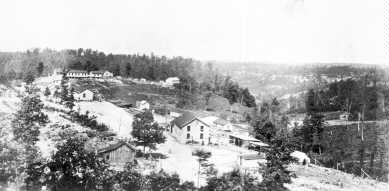
Camp Near Zoe, Lee County, Kentucky
Writing about the camp in Kentucky, my father says:
When the oilfield near Eldorado, Kansas was dwindling, the Hopkins families there found it necessary to find employment elsewhere. Fortunately, the company superintendent there had been given notice of his transfer to the newly-developing oilfield in Lee County, Kentucky. He promised Uncles Charlie and Will jobs there when he was established, and thot he could find papa a place also. Uncle Charlie and Uncle Will moved their families there first, and since they were made foremen in different sections of the field, they rated good-quality houses, as company houses go. They didn't have a house ready for papa and his family yet, which is the reason papa had to "park" his family in Ft. Wayne until his house was completed. It also provided a chance for us children to attend a good school. We boarded there with mama's step-mother. When school was out papa sent for his family, and we disembarked from the L. & N. at Torrant in Wolfe County, about 7 miles, I believe, from where we were to live. The house was much better than the one they provided in Kansas. It was situated next to the Torrant-Beatyville road, which was the only road in existence thereabouts at that time. Uncle Charlie, Grandma & Aunt Emma lived a short distance south of us, and Uncle Will's family lived in a far-eastern section of the field. I believe Aunt Dessie ran a boarding hall for some of the workers.
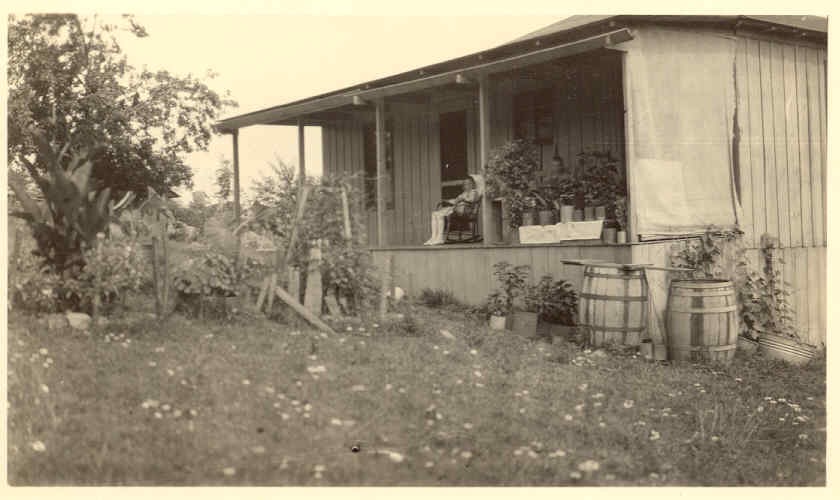 Oil Field House, Lee County Field |
Papa's power house sat on the top of a hill directly across the road from our house. Rodlines extended east, west and south of it, some of them for a distance of more than a mile. It was his job to keep them oiled and to keep the wells pumping, and to maintain the equipment in the powerhouse itself. He also gauged the oil in the tanks and was responsible for getting them connected to the main outgoing line. All that imposed a great deal of responsibility on him, and pain also, since he was having a lot of trouble with his legs at that time. No wells were located to the north of the powerhouse, as a deep "canyon," which they called "The Cellar," dropt off abruptly on the north side of the hill. The Cellar held a fascination for us kids, because it was so primitive and mysterious.
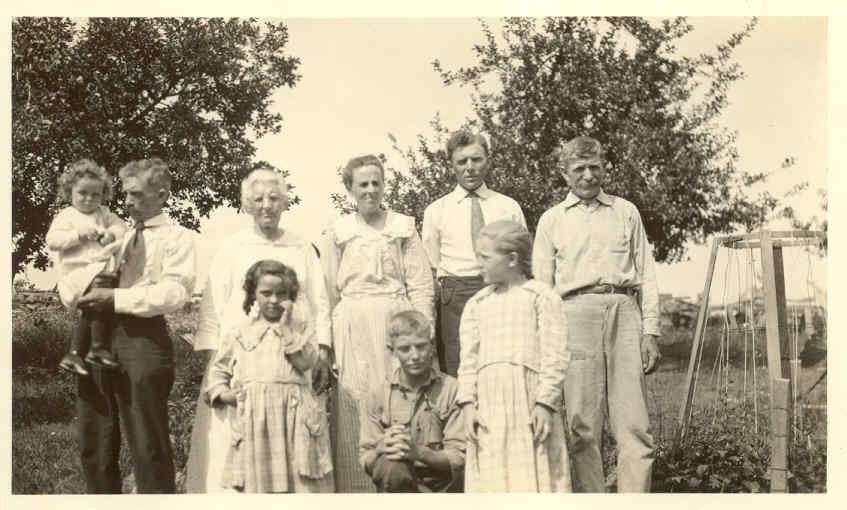 Some of The Hopkins Family My Father Lower Center, His Father On Right |
Water was always a problem there. Our supply was a spring that never seemed to run dry. It was located in a cave at the bottom of the "hollow" south of Uncle Charlie's place, and all the water both families used for all purposes came from that spring. Laundry was always a problem for the womenfolk, more so in Kansas than in Kentucky.
The nearest store available to us was a primitive general store and postoffice at Zoe, a one store-one house stop on the road, a mile or two from where we lived. The road was always in terrible condition, partly because of all the heavy oilfield equipment being hauled over it, but to an even greater extent by the presence of springs in it, thruout most of its length. I heard of one instance where a six-mule team drowned in one mudhole at another stop in the road called Zechariah. The mudhole was reputed to be a quarter of a mile in length. They finally used oxen to snake the equipment out of that mudhole. Both mules and oxen were widely used there. I can remember seeing twentytwo-ox strings hauling some of the equipment as they passed our place. Nitroglycerin was used to "shoot" the new wells to bring them in. It was stored and used in long tim-plated cans, and was stored in a remote spot in the woods in what they called a "magazine". It was difficult to find workers who were willing to risk hauling it to location, over rocky roads, and those who accepted the job usually got rip-roaring drunk, knowing that might be their last haul. That happened to a couple of men who drove a "nitro" wagon by our house one day. We noticed that it was dripping liquid at the time. A couple of hours later an explosion occurred about three miles from us that rattled dishes off the shelves. It was that nitro wagon, along with two men, four mules, and two lead horses. They found enough mixed remains to fill two cigar boxes, which they reverently interred.
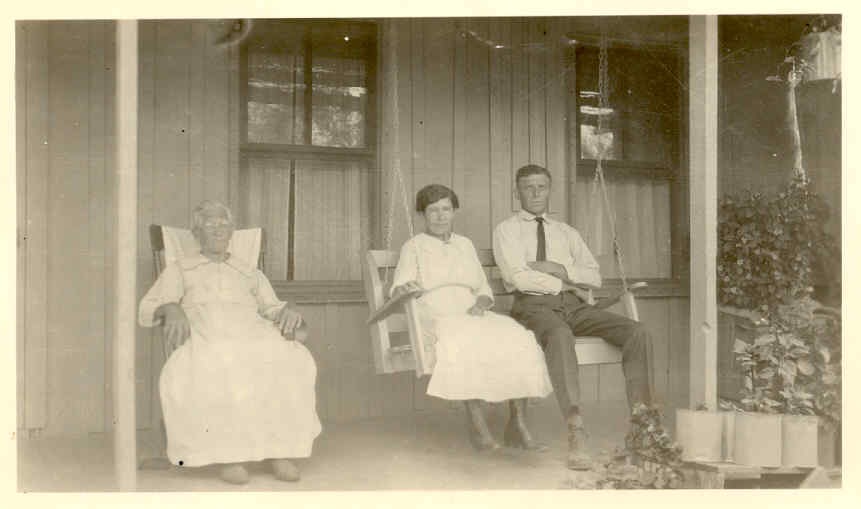 Mary Ann, Emma, and Charlie Hopkins |
There was a "school" about three quarters of a mile from where we lived, but they couldn't get a teacher to remain there to hold classes. The windows were being perpetuallly shot out by the local hoodlems. That's why mama & papa sent Ruth and I to the boarding school at Stanton. and later sent Donnie for part of one year. Providing schooling for us children was probably the main reason why mama and papa broke up. Mama took us to Berea where we could get the best schooling in that region.
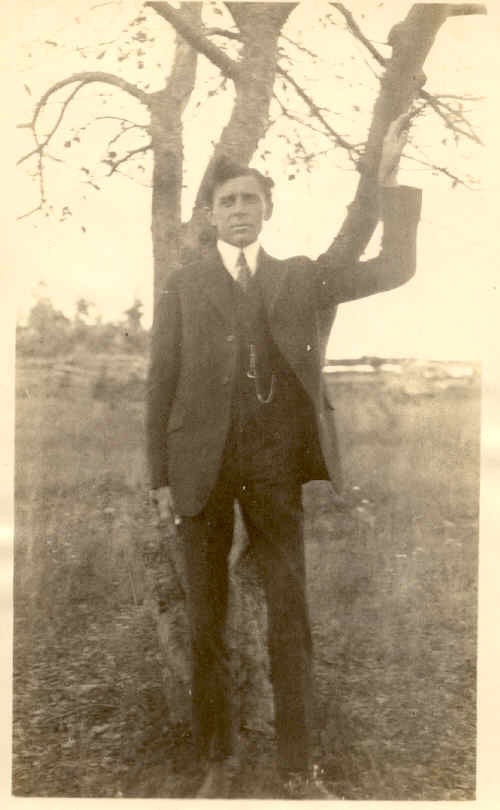 Charlie Hopkins |
The lifestyle and mannerisms of the mountain folk were a source of bewilderment to us. We felt that we were in a different world or different age. Many of the people were friendly enough after getting acquainted, but to the most of them we were "furriners." Mooshining was an accepted form of life there, and one time when Ruth, Donnie & I, along with Uncle Will's James and Charles ventured too far along a path leading into the Cellar, we had a warning shot sing over our heads, warning us that we had gone far enough. Another time I had to face down a l6 year old bully who held a 38 caliber on me, trying to humble me and get the upper hand on us kids. He finally lowered his gun and went away.
I just remembered something I had intended writing about in this message. It concerns how papa made the trip from Kansas to Kentucky. He chartered a boxcar, and loaded all the family belongings, together with his team and wagon, and our Collie, Trixie into it. He remained in the boxcar with them during the whole trip. Not exactly first class, maybe, but it shows the kind of stuff your grandfather was made of.
| Go to Oil Field Main Page | Eldorado, Kansas | Parkerton, Wyoming | Iraan, Texas |
This file was last updated on 12/30/2017.
| Home | Contents | What's New | Myself |